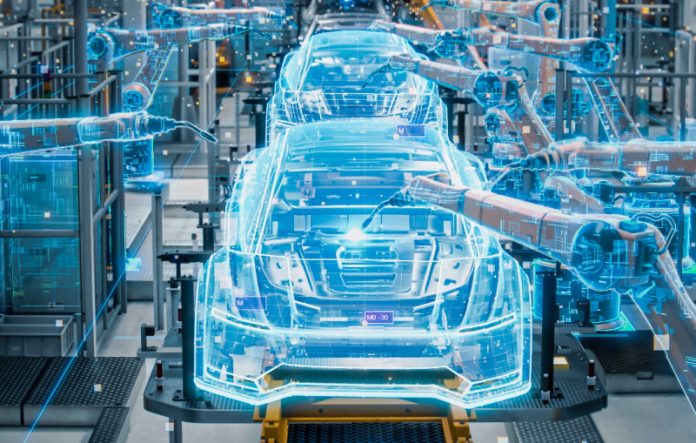Electric and hybrid vehicle manufacturing has been growing at an even higher pace in recent months (by 74% in July). With overall annual production numbers looking to hit the million mark by the end of 2028, the sector is back in full throttle, and automotive companies need their manufacturing plants to be in top gear to thrive in this incredibly competitive environment.
Getting into pole position
In fact, manufacturing excellence has never been more paramount. Car manufacturers need their factories to be operating at peak performance. Ultra-reliable systems are a must, with all machines fully optimised. There’s no room for downtime in the production line, nor the delays or defects in manufacturing that can result from problems in the repetitive process of assembling parts.
Today, car manufacturers need fully-functioning factories supported with IT infrastructures, systems and solutions that not only run seamlessly, but can autonomously identify potential faults – and repair and replace parts before they are given a chance to fail.
And that’s where a private 5G network solution comes in.
5G for a smooth ride
A 5G private network can create the stable, reliable network with wireless flexibility that manufacturers – automotive or otherwise – need in their factories. 5G private networks offer completely tailorable, secure, low-latency and time-sensitive abilities for devices and services or applications within them.
When paired with artificial intelligence (AI) and automation, a private network can transform manufacturing processes and improve productivity, efficiency, environmental impact and safety, while reducing costs.
A 5G private network is a game-changer when it comes to running data analytics securely. The process for analytics used to be as such: information was fed back from end devices to one central environment within the business, or the organisation’s cloud. From there, it would be processed, and then insights and actions would be sent back to the same devices.
Today, a 5G-powered private network means data analytics can happen right at the edge of the estate, for optimal, predictive machine maintenance. Devices in dispersed locations across the infrastructure can process information on the spot and understand if they need to be operating differently, or if there are any defects. They can either then act on that information autonomously and make the changes needed to operate more efficiently or send a signal to the maintenance team to remotely repair any defects before they cause any downtime.
Accelerating with 5G: Ford Motor Company
Ford Motor Company is a great example of a car manufacturer that has used a 5G private network to great effect. Ford needed to create a reliable network to support all of its critical production and maintenance processes at its manufacturing plant in Dunton, Essex.
It created a 5G private network in collaboration with Vodafone, using mid-range 1GHz – 6GHz spectrum. With a Mobile Private Network (MPN), Ford got the best of both worlds; the reliability and responsiveness of a wired connection, but with the cable-less flexibility and cost-effectiveness of wireless connections.
Furthermore, the wireless solution means the company were able to bring new facilities online faster, while manufacturers of production line machines were able to configure them remotely, so they could get up and running in Ford’s facilities as soon as they arrive at the factory.
The private network used 5G connectivity for multiple reasons, including real-time analysis of machine performance, defect spotting and the management of responses to any changing conditions during the production process. Artificial intelligence (AI)-based predictive maintenance was deployed to spot defects and reduce downtime, while augmented reality (AR) and mixed reality (MR) techniques were used to support the remote maintenance of factory equipment.
An example of how Ford’s network has been crucial in avoiding downtime can be seen with the process it deployed for the maintenance of the lasers it uses in its electric vehicle manufacturing.
Quality checking of its laser equipment was expensive, tedious and repetitive for the employees in the Ford factory. The firm therefore wanted to move to an automated process which used data to continuously monitor and, where applicable, carry out maintenance of its laser machines.
With a 5G private network as the basis, Ford created a mixed reality solution for maintenance, based on PTC’s Vuforia platform. Typically, heat build-up in the laser system is a signal that laser lenses need either cleaning or replacing. By collecting data from the laser welding process, the solution identifies any build-up of heat and works out if the lasers either needed maintenance or repair.
From there, it worked autonomously to take care of the problem. If the lenses are at the end of their life and physical replacement is needed, then a technician was alerted, and remotely guided through the laser lens replacement process while wearing a HoloLens.
While the trial has now ended, the 5G private network proved invaluable in eliminating unnecessary downtime in the production line and, of course, the consequent delays in manufacturing that would have occurred.
5G private networks helping car manufacturers produce at the speed they need
We’re at an exciting time in the world of car production. Manufacturing numbers are growing to pre-pandemic levels, and they’re showing no signs of slowing down before the end of the decade. However, to continue to compete, and to meet these impressive numbers, car manufacturers need to make sure that their factories are helping them produce at the quickest possible speed.
And that means optimised production lines, running with as little downtime as possible. 5G private networks are already proving to be the solution that’s needed for leading car manufacturers to conduct the monitoring and maintenance required for the very best manufacturing processes, and we’d urge more companies to follow suit.
Setting up a 5G private networks might seem like an overwhelming task, but there are many experts who can give advice and guide manufacturers through a deployment; ensuring they find the perfect solution for their organisation.
Source: The Manufacturer




